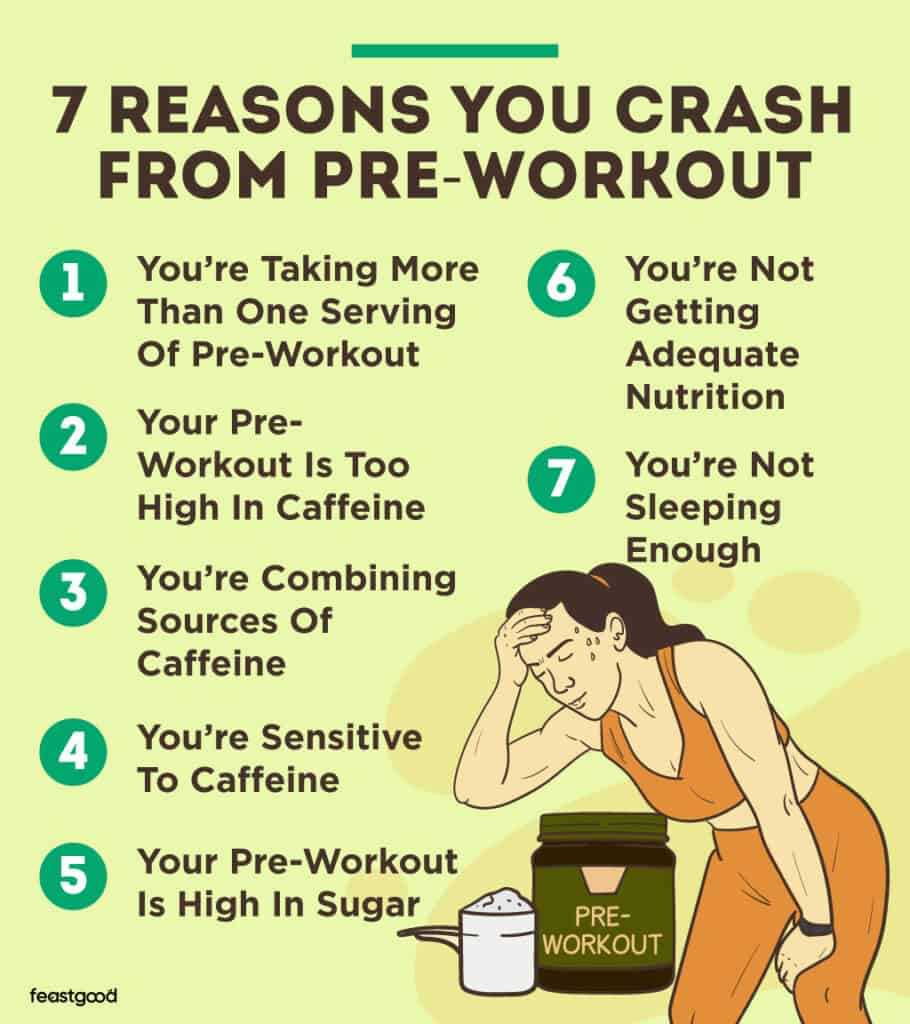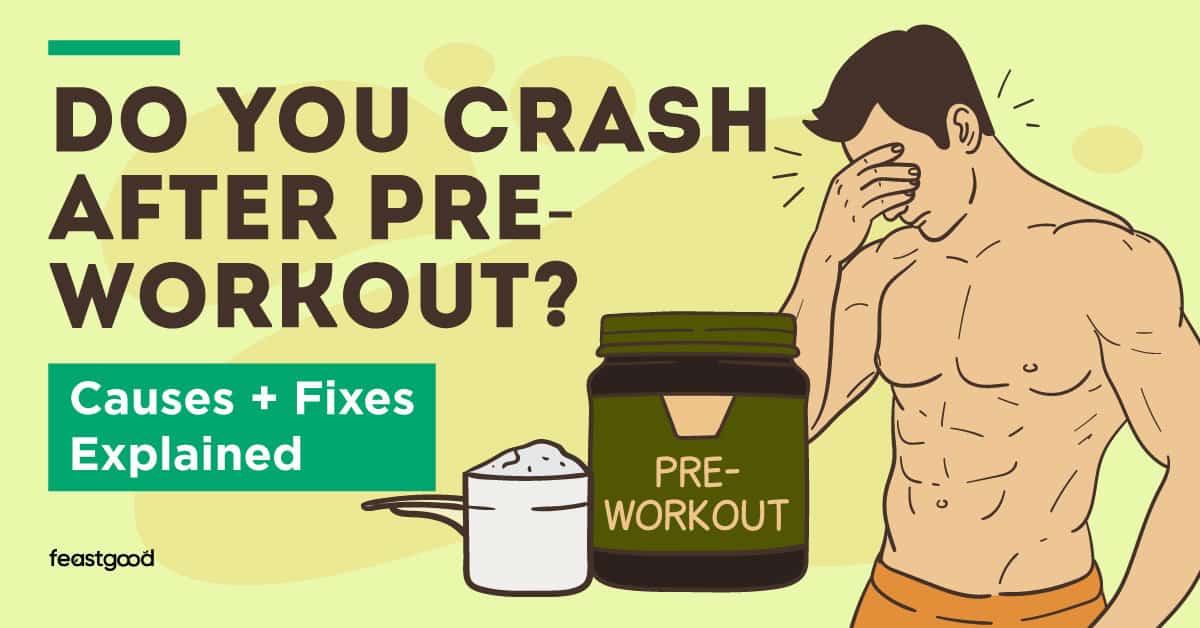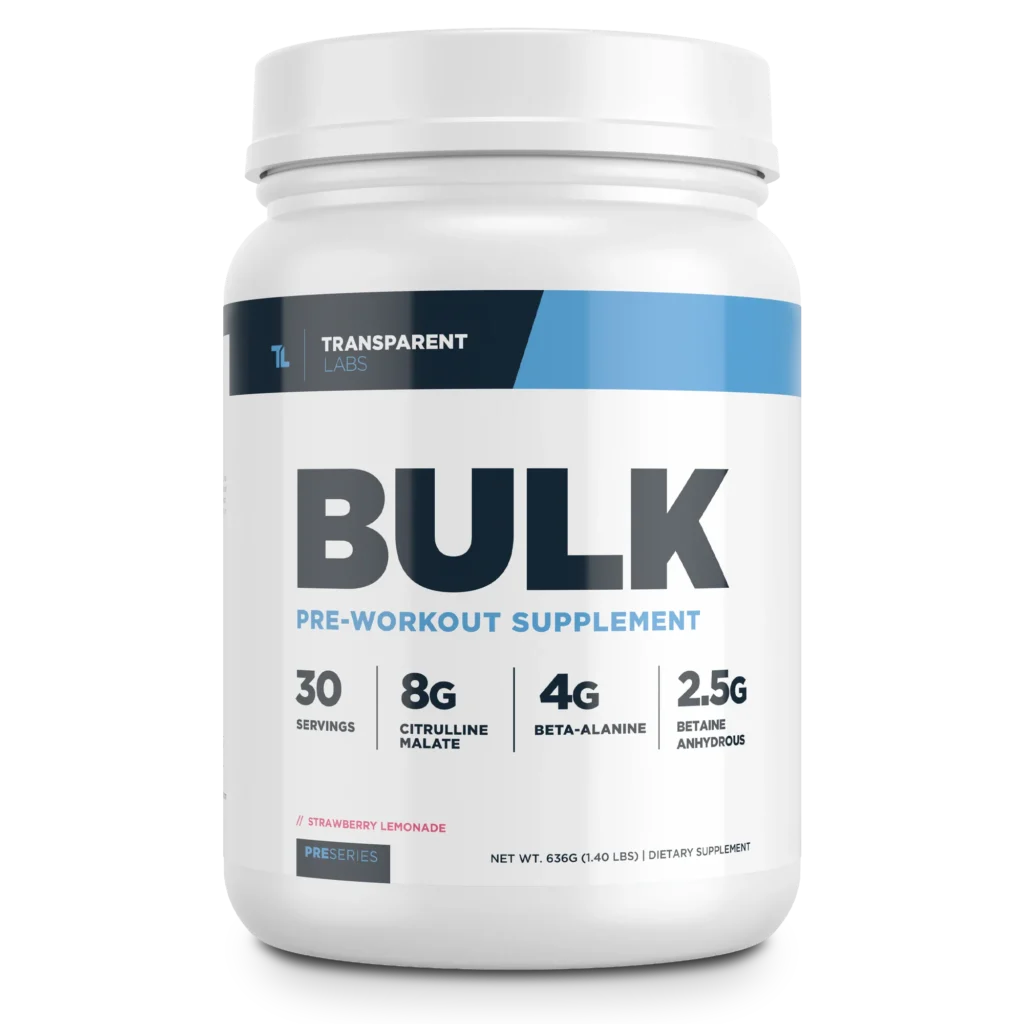Some links in this article are affiliate links, which means we earn from qualifying purchases. Learn more.
Ever felt that sudden energy slump after an intense workout, leaving you wondering if your pre-workout is to blame?
If you’re like me and many of my clients, you don’t have the luxury of just taking a nap after your workout, so you need to know how to fix (and avoid) the crash.
A pre-workout crash is caused by a buildup of the molecule adenosine in the brain, signaling sleepiness, which is often the result of taking caffeine in excess of 200 mg. You can avoid a crash by reducing caffeine intake, switching your pre-workout supplement to be “stim-free”, and focusing on good nutritional habits.
Below, I’ll explore each of the ingredients that could be contributing to your “crash”, and 7 solutions to avoid
Key Takeaways
- Your total caffeine intake for the day can contribute to your crash, so you need to track all sources of caffeine including tea, coffee, and soda, and not just your pre-workout.
- Certain brands of pre-workout supplements increase your risk of experiencing a crash, whereas others reduce your risk.
- You shouldn’t be using pre-workout for energy in place of getting a good night’s sleep and eating an overall balanced diet.
Will You Crash If You Take Pre-Workout?
You aren’t guaranteed to crash if you take pre-workout because not all pre-workout supplements contain enough caffeine and sugar to result in a crash.
Generally, pre-workout supplements with 200mg or less caffeine that are made with non-caloric sweeteners will not cause a pre-workout crash.
That said, individuals who are sensitive to caffeine could experience a pre-workout crash with less than 200mg of caffeine, especially if it’s paired with sugar because sugar encourages a crash.
The more caffeine you consume (especially all at once, like in a high-caffeine pre-workout), and the harder you train, the more likely you are to experience a pre-workout crash.
You’re also more likely to crash if you’re not supporting your training efforts with adequate nutrition and sleep.
You can reduce your risk of a pre-workout crash in a number of ways, which I’ll touch on later.
- Check out my complete list of 9 Pre-Workout Alternatives That Won’t Make You Crash.
What Does A Pre-Workout Crash Feel Like?
A pre-workout crash is an overwhelming feeling of being sleepy or drowsy after a workout, and can also include irritability and difficulty concentrating.
Effects vary from person to person and can include feeling lightheaded, dizzy, shaky, or nauseated.
A pre-workout crash can feel as though it comes on fairly rapidly, about an hour after you finish your workout since it typically sets in a few hours after ingesting a large amount (>200 mg) of caffeine.
How Long Does A Pre-Workout Crash Last?
A pre-workout crash typically lasts between 30 minutes and 2 hours.
However, the effects will last longer when someone is more sensitive to stimulants, when a larger dose is taken, or when a training session is extremely intense.
How long a crash will last can also depend on your ability to rest and recuperate after your workout.
For example, someone who goes straight from an intense training session to a demanding job without time for a snack, especially if that job is physically active as well, will likely crash harder for longer than someone who gets a good post-workout meal and then sits down to relax.
Pre-Workout Ingredients That Make You Crash
The two ingredients that are most likely to make you crash are caffeine and sugar because they elevate energy levels and then can leave you feeling drained when they wear off.
Caffeine
During a workout, your body is breaking down a molecule called adenosine triphosphate (ATP) – which is the energy source that is used by your cells. When your body uses ATP it releases a molecule of adenosine.
Normally, this adenosine will bind to receptors in the brain, letting you know you’re running out of energy and need to rest. However, caffeine blocks these receptors so you don’t feel tired.
This reduced perception of fatigue and effort allows you to keep pushing and breaking down even more ATP and releasing even more adenosine.
When the caffeine finally wears off (a few hours after your workout) and the receptor sites in the brain become available again, they will be overwhelmed with the adenosine molecules in your body that let you know you’re low on energy and in need of rest.
This is what leads to the sharp drop in energy which is known as the crash.
Sugar
Another pre-workout ingredient that can contribute to a crash is sugar because it’s a fast-digesting carbohydrate that is absorbed into the bloodstream and used to provide energy at a faster rate.
Sugar converts to energy very quickly, but it’s also very quick to dissipate, leaving you with low blood sugar.
Low blood sugar after a workout can lead to feelings of shakiness and light-headedness that are part of a crash.
7 Reasons You Crash From Pre-Workout & How To Fix

Here are the most common reasons why you crash from pre-workout, and solutions for each one:
1. You’re Taking More Than One Serving Of Pre-Workout
If you’re taking more than the recommended dose of pre-workout, you could be ingesting too much caffeine, which increases the risk of a crash.
For example, if one scoop of pre-workout has 150 mg of caffeine but you take two scoops, you would be getting 300 mg of caffeine.
Solution: Stick to the recommended serving size for your pre-workout and make sure that the caffeine amount is less than 200 mg.
2. Your Pre-Workout Is Too High In Caffeine
Some pre-workout products are so high in caffeine that even one serving is well over 200 mg.
When you’re shopping for a pre-workout, it’s important to read the label to see how much caffeine is in one serving so that you’re not overdoing it.
I’ll point out these high-caffeine brands in the section “Pre-Workouts To Avoid,” below.
Solution: Do not use a pre-workout that contains more than 200 mg of caffeine per serving, or choose to take ½ a serving so that you’re reducing your caffeine intake to avoid a crash.
3. You’re Combining Sources Of Caffeine
Your pre-workout by itself might not have too much caffeine, but if you take it along with another source of caffeine like an energy drink (Bang, Monster, or Red Bull), or with coffee, then you could be setting yourself to exceed 200 mg.
To reduce your risk of a pre-workout crash it’s best to keep your serving of caffeine intake under 200mg, but it’s also important to consider how much caffeine is safe to consume in one day.
The daily safe limit for caffeine is 400 mg, so if you’re training twice a day and want to take pre-workout for both sessions then it’s important to stay under 400mg in total.
Solution: To make sure that you’re not getting too much caffeine overall, it’s best to track your caffeine intake, either along with tracking your macros (the Cronometer app tracks caffeine), or with a dedicated caffeine tracking app like HiCoffee for Apple or the aptly named Caffeine Tracker from Google Play.
4. You’re Sensitive To Caffeine
Some people are just naturally more sensitive to caffeine than others and will be more likely to experience a pre-workout crash even at lower levels of caffeine intake (less than 200 mg or even less than 100 mg).
If you’re someone who is sensitive to coffee or doesn’t drink coffee, then it’s safe to assume that you’re going to have a lower tolerance for caffeine. In this case, I would recommend starting with a lower dose (<100mg).
Solution: Look for brands with lower amounts of caffeine per serving, or choose a non-stimulant pre-workout (marketed as “non-stim”). One of my stiff-free pre-workouts is Swolvering Pre (click to read my review).
5. Your Pre-Workout Is High In Sugar
If your pre-workout is high in sugar, it can contribute to a crash as soon as you burn through the sugar and experience a drop in blood sugar levels. When this happens you can expect to feel shaky, lightheaded, dizzy, or nauseous.
Sugar can actually be a great source of energy before and during your workout since it dissolves easily in liquids and is rapidly absorbed by your body.
But, it’s important to refuel after your workout to balance your blood sugar by having a meal or snack that provides both protein and carbohydrates.
Solution: Eat a post-workout snack within 30 minutes of training to stabilize blood sugar levels. Aim for a ratio of at least 2:1 carbs to protein, and keep fat and fiber intake low since these will slow down digestion.
A quick and easy option is a protein shake made with juice (I like orange juice and vanilla whey for an “orange creamsicle” shake).
6. You’re Not Getting Adequate Nutrition
Beyond just your post-workout snack, it’s important to make sure that your overall diet is well-balanced by providing enough calories and macronutrients (carbs, fats, and protein) to support your health and performance.
Individual needs vary based on age, height, weight, lifestyle, stress levels, training, occupation, and more. Your best bet is to reach out to a qualified nutrition coach or Registered Dietician (like me) to figure out the best nutrition strategy for your goals.
Solution: Eat regular balanced meals that contain lean protein, complex carbohydrates (i.e. grains, starchy vegetables, or legumes), vegetables and/or fruits, and healthy fats.
An example of a balanced meal would be chicken breast with rice, steamed broccoli, and olive oil.
The exception to balanced meals would be your pre and post-workout meals which should be mainly protein and carbs, and very little fat.
7. You’re Not Sleeping Enough
If you’re not getting an average of 7-9 hours of good quality sleep each night, you are also more likely to experience a pre-workout crash. The tiredness you feel from working out will add to the fatigue you are already feeling from lack of sleep.
When you get a poor night’s sleep, or you have to wake up extra early for a training session, it can be really tempting to take pre-workout (or an extra dose of pre-workout) to give you the energy to get through the workout.
However, this is the absolute worst thing you can do when it comes to avoiding a crash. It’s far better to skip the session than to push yourself too hard and risk injury or illness as a result of fatigue.
Solution: Prioritize getting at least 8 hours of sleep each night by setting a bedtime schedule and routine to help you wind down. Make sure your bedtime is at least 8 hours before your wake-up time in the morning.
- Related Article: What To Do If You Can’t Fall Asleep After Taking Pre-Workout (9 Tips)
What Should You Do If You’re Already Experiencing A Pre-Workout Crash
Follow these simple steps if you’re already experiencing a pre-workout crash:
- Eat: if you haven’t already had a post-workout snack, be sure to find something to eat to give your body a source of energy to start the recovery process. After your post-workout meal, ensure your next meal is a balanced meal to help balance your blood sugar levels.
- Sleep: if it’s practical, try to take a nap. If that’s not possible, then make an effort to get to bed as early as you can. When you’re asleep is when your body recovers the most.
- Rest Up: consider skipping your next workout or implementing active recovery (i.e. walking rather than lifting) to make sure that you’re fully recovered. Ensuring adequate recovery will reduce the risk of having another pre-workout crash.
What you should NOT do is take another serving of pre-workout to boost your energy level to help propel you through another workout, especially if you’re not recovered from the one prior.
Pre-Workout Brands To Avoid If You Crash
If you’re prone to pre-workout crashes, you’re going to want to steer clear of these high-caffeine brands of pre-workout. I’ve listed them in order, from highest to lowest caffeine content:
- MyoBlox LOCO Pre-Workout Nitric Oxide Booster: 400 mg caffeine per serving.
- Pre-Kaged Elite Pre-Workout Powder: 388 mg caffeine per serving
- PRO SUPPS Mr. Hyde Xtreme Pre-Workout Powder: 378 mg caffeine per serving
- Legion Pulse Pre-Workout Supplement: 350 mg caffeine per serving
- Psycho Pharma New Perfect Powders: 350 mg caffeine per serving
- REDCON 1 Total War Pre-Workout: 320 mg caffeine per serving
- Cellucor C4 Ultimate Shred Pre Workout Powder: 300 mg caffeine per serving
- BSN N.O.-Xplode Vaso Pre-Workout: 300 mg caffeine per serving
- Pre Jym High Performance Pre Workout: 300 mg caffeine per serving
- Beyond Raw LIT Clinically Dosed Pre-Workout Powder: 250 mg caffeine per serving
There are also many other products on the market that contain more than 200 mg of caffeine per serving.
Additionally, watch out for any brands that do not disclose the exact amount of various ingredients on the label.
If they have “proprietary blends” listed as an ingredient that doesn’t list how much or what the ingredients are, you’re better off avoiding them.
Pre-Workouts That Won’t Make You Crash
The good news is that there are many non-stim pre-workout brands that do not contain any caffeine at all, and brands that have a small amount of caffeine (<200 mg).
Here are some of our favorite non-stim brands (0 mg caffeine):
- Transparent Labs Stim-Free Non-Caffeinated Performance Formula
- KAGED Pre-Kaged Stim-Free
- Axe & Sledge Hydraulic
- Type Zero Clean Pre Workout Stim-Free N.O. Booster
If you want some caffeine, here are some of our favorite pre-workouts with <200mg of caffeine:
- Huge Supplements Wrecked Pre-Workout Powder: 125 mg caffeine per scoop
- C4 Sport Pre Workout Powder: 135 mg caffeine per serving
- Gorilla Mode Pre Workout: 175 mg caffeine per serving
Plus, you can do what I do and take other performance-boosting ingredients individually or together to make your own custom pre-workout “stack.” This way you’re sure to get only the exact ingredients you want, in the dose that you want, and nothing you don’t want.
I mix beta-alanine, betaine, branched-chain amino acids, l-citrulline malate, and creatine monohydrate to make my own custom pre-workout.
Check out our Pre-Workout Dosage Calculator to figure out the right amount of key ingredients for you.
Frequently Asked Questions
Can Too Much Pre-Workout Make You Crash?
Yes, too much pre-workout can increase the chances of a pre-workout crash, especially if you consume more than 200 mg of caffeine. Those who are sensitive to caffeine may even feel the effects of a pre-workout crash with less than 200mg of caffeine.
Can You Avoid A Pre-Workout Crash?
Yes, you can avoid a pre-workout crash by reducing or avoiding caffeine intake, and ensuring that you have had a good night’s sleep and a balanced pre-workout meal or snack before your training session.
Can A Pre-Workout Crash Last More Than A Day?
It’s rare but possible for a pre-workout crash to last more than a day, especially if you get a very poor night’s sleep and fail to eat enough after your workout. Getting 7-9 hours of sleep and adequate nutrition are your body’s two primary ways to restore energy.
Reference
Richard A. Stecker, Patrick S. Harty, Andrew R. Jagim, Darren G. Candow & Chad M. Kerksick (2019) Timing of ergogenic aids and micronutrients on muscle and exercise performance, Journal of the International Society of Sports Nutrition, 16:1, DOI: 10.1186/s12970-019-0304-9
About The Author

Lauren Graham is a Precision Nutrition Level 1 certified nutrition coach. She focuses on helping busy professionals balance healthy eating and purposeful movement. Lauren has a background in competitive swimming and is currently competing as a CrossFit athlete. She has a passion for training, teaching, and writing.
Why Trust Our Content

On Staff at FeastGood.com, we have Registered Dietitians, coaches with PhDs in Human Nutrition, and internationally ranked athletes who contribute to our editorial process. This includes research, writing, editing, fact-checking, and product testing/reviews. At a bare minimum, all authors must be certified nutrition coaches by either the National Academy of Sports Medicine, International Sport Sciences Association, or Precision Nutrition. Learn more about our team here.
Have a Question?
If you have any questions or feedback about what you’ve read, you can reach out to us at [email protected]. We respond to every email within 1 business day.


